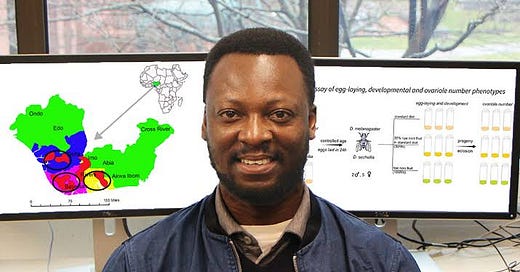Metabolomics: Africa's Untapped Scientific Frontier
A groundbreaking conversation with Dr. Olakunle Jaiyesimi on how metabolomics could transform Africa's healthcare, agriculture, and biotech landscape
What if we told you that one of the most promising scientific frontiers for African innovation has barely been explored?
The Africa Deep Tech Community recently hosted Dr. Olakunle Jaiyesimi, a pioneering researcher and entrepreneur in the field of metabolomics, for an eye-opening discussion on how this emerging field could address some of Africa's most pressing challenges while creating unprecedented economic opportunities.
What is Metabolomics?
Put simply, metabolomics is the comprehensive study of small molecules in biological systems. While genomics tells us what could happen in an organism, metabolomics reveals what is happening.
"Metabolomics is the storyteller for the body," explained Dr. Jaiyesimi. "It's the closest to phenotype—to what actually matters in health outcomes, plant productivity, or environmental impacts."
This distinction makes metabolomics uniquely valuable for applications ranging from healthcare to agriculture and beyond.
Why This Matters for Africa
Africa's potential in metabolomics is extraordinary for several reasons:
Africa holds 25% of global biodiversity, containing countless undocumented metabolites with potential applications in healthcare and beyond
Rich traditional knowledge of medicinal plants and practices that haven't been scientifically validated
Unique health challenges that could benefit from more precise diagnostic and treatment approaches
Agricultural optimization needs specific to African soil conditions and climate challenges
Environmental monitoring requirements for pollution, climate change impacts, and resource management
Four Transformative Applications
1. Precision Medicine Revolution
Current medical practice often treats symptoms rather than causes, or targets single biomarkers (like vitamin D levels) without understanding the complete metabolic picture.
Dr. Jaiyesimi shared a compelling example: "A patient in the US was prescribed vitamin D supplements after a blood test showed low levels. This led to vitamin D toxicity that affected him for two years because conventional testing didn't check for vitamin D metabolites—only vitamin D itself."
Metabolomics could transform African healthcare by enabling:
Personalized treatment plans based on individual metabolism
Early disease detection before symptoms appear
More accurate diagnoses for complex conditions
2. Unlocking African Biodiversity
"We have local remedies like Apuro-pai Jebu that people believe can cure multiple conditions," noted Dr. Jaiyesimi. "But without scientific validation through technologies like metabolomics, these remain anecdotal rather than clinical options."
Metabolomics provides tools to:
Identify bioactive compounds in traditional medicines
Validate efficacy claims scientifically
Develop standardized, evidence-based treatments from indigenous knowledge
Create intellectual property from Africa's natural resources
3. Agricultural Advancement
Africa's agricultural challenges—from soil quality to drought resistance—could benefit tremendously from metabolomic insights:
Soil health mapping: Understanding regional differences in soil composition at the molecular level
Crop optimization: Identifying metabolic pathways that enhance drought resistance or pest tolerance
Food security: Ensuring nutritional quality through comprehensive content analysis
4. Environmental Monitoring
Dr. Jaiyesimi highlighted ongoing work using metabolomics to study crude oil pollution's impact on communities in Nigeria's Niger Delta:
"We're using fruit flies as biosensors to detect metabolic changes caused by environmental pollution. This could lead to early warning systems for communities impacted by industrial activities."
Challenges and Pathways Forward
The conversation didn't shy away from implementation challenges:
Cost barriers: LC-MS instruments cost $200,000-$1,000,000
Infrastructure limitations: Maintenance, power supply, transportation of samples
Expertise gaps: Limited training opportunities in metabolomics
Integration hurdles: Adapting existing systems to incorporate new technologies
However, several promising strategies emerged:
Collaborative infrastructure: Shared facilities across institutions to maximize resource utilization
Education-first approach: Webinars, training programs, and awareness building
Strategic partnerships: Connecting researchers, clinicians, entrepreneurs, and technology experts
Technology adaptation: Using AI to accelerate learning and virtual labs to simulate equipment
African metabolome database: Building a comprehensive repository of African metabolomic data
The Future We Can Build
The discussion revealed a vision for Africa not just adopting metabolomics but potentially leading in this field:
"Africa has the resources to leverage metabolomics and become a global leader in this innovative technology," asserted Dr. Jaiyesimi.
Participants envisioned a future where:
Mobile, affordable LC-MS devices bring metabolomics to underserved communities
AI-powered analysis democratizes access to metabolomic insights
Cross-disciplinary collaboration creates integrated health and agricultural solutions
Economic opportunities keep local expertise within Africa, preventing brain drain
African biodiversity leads to novel treatments for global health challenges
Join the Conversation
This session exemplified the Africa Deep Tech Community's mission to bridge disciplines and foster innovation addressing Africa's unique challenges.
The enthusiasm from participants—including experts in genomics, healthcare delivery, AI, and business development—demonstrated the potential for cross-functional collaboration in this emerging field.
As we continue exploring frontiers at the intersection of deep technology and African innovation, we invite you to:
Attend this Metabolomics introductory webinar in April
Share your thoughts in the comments
Connect with Dr. Jaiyesimi and other innovators in this space
Register for the upcoming Deep Tech Summit in Morocco!
The second edition of the Deeptech Summit 2025, happening on May 8-9, 2025, at the University Mohammed VI Polytechnic (UM6P) campus in Benguerir, Morocco.
Mohammed VI Polytechnic University is a Moroccan non-profit private research university with a major focus on Deep Tech. It is also home to UM6P Ventures, the university's investment arm with an impressive Deep Tech investment portfolio actively invested in Agriculture, Chemicals, GreenTech, and Healthtech.
The university is inviting African researchers, investors, entrepreneurs, and policymakers, to register and engage with the second edition of the Deeptech Summit (DTS) 2025, happening on May 8-9, 2025, at the University Mohammed VI Polytechnic (UM6P) campus in Benguerir, Morocco.
Register For DeepTech Summit 2025, HERE!
Africa Deep Tech Foundation connects innovators, creators, and visionaries across the continent and diaspora. Learn more at africadeeptech.org.
What do you think about the potential of metabolomics in Africa? Share your thoughts in the comments below!



![Postdoc Spotlight: Olakunle Jaiyesimi [Extavour Lab] - Harvard University - Department of Molecular & Cellular Biology Postdoc Spotlight: Olakunle Jaiyesimi [Extavour Lab] - Harvard University - Department of Molecular & Cellular Biology](https://substackcdn.com/image/fetch/$s_!PTfH!,w_1456,c_limit,f_auto,q_auto:good,fl_progressive:steep/https%3A%2F%2Fsubstack-post-media.s3.amazonaws.com%2Fpublic%2Fimages%2Fb08d91ee-1dc1-4403-9414-d07eb5dafe9c_715x429.jpeg)

